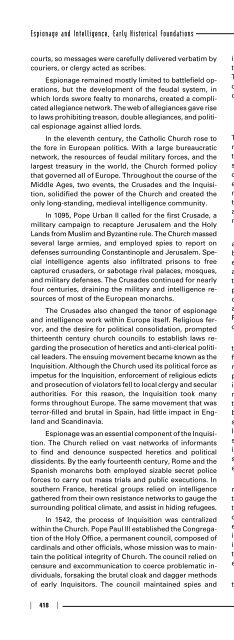ENCYCLOPEDIA OF Espionage, Intelligence, and Security Volume ...
ENCYCLOPEDIA OF Espionage, Intelligence, and Security Volume ...
ENCYCLOPEDIA OF Espionage, Intelligence, and Security Volume ...
You also want an ePaper? Increase the reach of your titles
YUMPU automatically turns print PDFs into web optimized ePapers that Google loves.
<strong>Espionage</strong> <strong>and</strong> <strong>Intelligence</strong>, Early Historical Foundationscourts, so messages were carefully delivered verbatim bycouriers, or clergy acted as scribes.<strong>Espionage</strong> remained mostly limited to battlefield operations,but the development of the feudal system, inwhich lords swore fealty to monarchs, created a complicatedallegiance network. The web of allegiances gave riseto laws prohibiting treason, double allegiances, <strong>and</strong> politicalespionage against allied lords.In the eleventh century, the Catholic Church rose tothe fore in European politics. With a large bureaucraticnetwork, the resources of feudal military forces, <strong>and</strong> thelargest treasury in the world, the Church formed policythat governed all of Europe. Throughout the course of theMiddle Ages, two events, the Crusades <strong>and</strong> the Inquisition,solidified the power of the Church <strong>and</strong> created theonly long-st<strong>and</strong>ing, medieval intelligence community.In 1095, Pope Urban II called for the first Crusade, amilitary campaign to recapture Jerusalem <strong>and</strong> the HolyL<strong>and</strong>s from Muslim <strong>and</strong> Byzantine rule. The Church massedseveral large armies, <strong>and</strong> employed spies to report ondefenses surrounding Constantinople <strong>and</strong> Jerusalem. Specialintelligence agents also infiltrated prisons to freecaptured crusaders, or sabotage rival palaces, mosques,<strong>and</strong> military defenses. The Crusades continued for nearlyfour centuries, draining the military <strong>and</strong> intelligence resourcesof most of the European monarchs.The Crusades also changed the tenor of espionage<strong>and</strong> intelligence work within Europe itself. Religious fervor,<strong>and</strong> the desire for political consolidation, promptedthirteenth century church councils to establish laws regardingthe prosecution of heretics <strong>and</strong> anti-clerical politicalleaders. The ensuing movement became known as theInquisition. Although the Church used its political force asimpetus for the Inquisition, enforcement of religious edicts<strong>and</strong> prosecution of violators fell to local clergy <strong>and</strong> secularauthorities. For this reason, the Inquisition took manyforms throughout Europe. The same movement that wasterror-filled <strong>and</strong> brutal in Spain, had little impact in Engl<strong>and</strong><strong>and</strong> Sc<strong>and</strong>inavia.<strong>Espionage</strong> was an essential component of the Inquisition.The Church relied on vast networks of informantsto find <strong>and</strong> denounce suspected heretics <strong>and</strong> politicaldissidents. By the early fourteenth century, Rome <strong>and</strong> theSpanish monarchs both employed sizable secret policeforces to carry out mass trials <strong>and</strong> public executions. Insouthern France, heretical groups relied on intelligencegathered from their own resistance networks to gauge thesurrounding political climate, <strong>and</strong> assist in hiding refugees.In 1542, the process of Inquisition was centralizedwithin the Church. Pope Paul III established the Congregationof the Holy Office, a permanent council, composed ofcardinals <strong>and</strong> other officials, whose mission was to maintainthe political integrity of Church. The council relied oncensure <strong>and</strong> excommunication to coerce problematic individuals,forsaking the brutal cloak <strong>and</strong> dagger methodsof early Inquisitors. The council maintained spies <strong>and</strong>informants, but shifted their focus to scrutinizing the actionsof Europe’s monarchs <strong>and</strong> prominent aristocrats.The advent of the Renaissance in Italy in the mid-fifteenthcentury quelled much of the fervor <strong>and</strong> political fear thatdrove the Inquisition, <strong>and</strong> the movement faded.The RenaissanceThe Renaissance marked the eclipse of the Church dominatedworld. Europe transitioned to more localized, nationalisticmodels of government, with each nation or citystateemploying its own intelligence force. As nations <strong>and</strong>city-states became wealthier <strong>and</strong> gained more power,espionage enjoyed a resurgence. Competition for dominanceover trade <strong>and</strong> exploration of the New World changedthe political climate of Europe, <strong>and</strong> forced regimes toadopt increasingly deft measures of protecting political,military, <strong>and</strong> economic interests.In response to the changing world, Niccolo Machiavelli,a Florentine political philosopher, published a series ofbooks detailing the qualities <strong>and</strong> actions of effective rulers.In his works, The Prince, <strong>and</strong> The Art of War, Machiavelliadvocated that rulers routinely employ espionagetradecraft, engaging in deception <strong>and</strong> spying to insureprotection of their power <strong>and</strong> interests. His advice, muchof which was culled from rediscovered works of Aristotle<strong>and</strong> Cicero, was intended for the ruling Medici princes ofFlorence. However, the works gained popularity severalcenturies after their 1520 publication.In the late 1500s, the English royal court developedthe premier Renaissance era spy network. Religious reforms<strong>and</strong> a schism with the Catholic Church under therule of Henry VIII, prompted the creation of a large secretpolice force, comm<strong>and</strong>ed by the military, to locate <strong>and</strong>infiltrate Catholic loyalist cells that threatened the Englishmonarchy. When his daughter, Elizabeth I, ascended tothe throne, political tensions threatened her reign. Elizabethchose to rebuild the flagging military to rebuff oppositionfrom disloyal lords <strong>and</strong> their forces, but especiallylobbied for the expansion of the Navy <strong>and</strong> intelligenceservices. The new navy dispatched foreign threats, defeatingthe Spanish Armada in 1558, while the intelligenceservices dispatched several conspiracy plots that threatenedto topple Elizabeth I’s reign.The Elizabethan court gained a reputation for theruthlessness of its spies, several of whom double <strong>and</strong>triple crossed those with whom they dealt. The Elizabethanespionage system was highly effective, but its novelcontribution to the development of espionage lay in itsemployment practices. Instead of relying on haphazard,ill-trained volunteers, or military men, the Elizabethanintelligence community employed linguists, scholars, authors,engineers, <strong>and</strong> scientists, relying on professionalexperts to seek <strong>and</strong> analyze intelligence information.Technological development in the Renaissance alteredthe practice of espionage. The development of small418 Encyclopedia of <strong>Espionage</strong>, <strong>Intelligence</strong>, <strong>and</strong> <strong>Security</strong>







![The Big Lie 9-11 and Government Complicity in Mass Murder [PDF]](https://img.yumpu.com/50957077/1/190x245/the-big-lie-9-11-and-government-complicity-in-mass-murder-pdf.jpg?quality=85)








